R Controlled Vowels Activities
Phonics, Spelling, & Grammar Resources
Unveiling the Mysteries of R-Controlled Vowels: A Complete Guide for Teachers
Teaching phonics is a pivotal step in helping young learners become proficient readers and writers. Among the many phonetic rules and patterns, R-controlled vowels stand as a unique challenge. In this teaching blog post, we’ll explore the world of R-controlled vowels, delve into the concept of “Bossy R,” understand why it’s crucial to teach this phonics rule and address the common difficulties students face when learning R-controlled vowels.
What are R-Controlled Vowels?
Before we dive into the teaching strategies, let’s clarify what R-controlled vowels are. R-controlled vowels are vowels that are influenced by the letter ‘R’ when it follows them in a word. This influence causes the vowel to have a different sound compared to how it would sound on its own. The most common R-controlled vowels are “AR,” “ER,” “IR,” “OR,” and “UR.” These combinations create unique sounds that can be found in words like “car,” “her,” “bird,” “for,” and “fur.”
Introducing the Concept of “Bossy R”
To teach R-controlled vowels effectively, it’s essential to introduce the concept of “Bossy R” to your students. “Bossy R” is a fun and engaging way to explain that when ‘R’ follows a vowel, it “bosses” the vowel around, making it sound different from its usual sound. This concept can be illustrated by teaching students that ‘R’ is like the bossy friend who takes charge and makes the vowel change its sound.
Why Teach R-Controlled Vowels?
Teaching R-controlled vowels is important for several reasons:
- Reading and Spelling Skills: Proficiency in recognizing and using R-controlled vowels is essential for accurate reading and spelling. These sounds appear in a multitude of words, and understanding them improves overall literacy skills.
- Expanding Vocabulary: A strong foundation in R-controlled vowels allows students to expand their vocabulary by reading and understanding more words. It empowers them to tackle a wider range of texts.
- Phonemic Awareness: Teaching R-controlled vowels enhances students’ phonemic awareness, helping them become more effective readers by recognizing patterns in words.
Common Student Difficulties
Teaching R-controlled vowels can be challenging due to the following common difficulties students face:
- Pronunciation Confusion: Students often struggle to pronounce R-controlled vowels correctly, sometimes substituting them with other vowel sounds.
- Spelling Errors: Students may misspell words containing R-controlled vowels, confusing them with words that have different vowel sounds.
- Blending Challenges: Some students find it challenging to blend R-controlled vowels with other consonants to form complete words.
Effective Strategies for Teaching R-Controlled Vowels
Now, let’s explore some strategies to help students master R-controlled vowels, regardless of whether it’s “AR,” “ER,” “IR,” “OR,” or “UR.”
- Visual Aids: Utilise tongue diagrams and mouth illustrations to demonstrate the tongue position when pronouncing R-controlled vowels. Visual aids make it easier for students to grasp the concept.
- Rhyming Games: Engage students in rhyming games with words that feature R-controlled vowels. This not only reinforces the sound but also improves their phonemic awareness.
- Storytelling: Incorporate stories and narrative activities that include R-controlled vowel words. Encourage students to create their stories using these words, making learning enjoyable.
- Word Families: Introduce word families that include R-controlled vowel words, such as “car,” “her,” and “fur.” This helps students recognize patterns and apply their knowledge to multiple words.
- Multisensory Approaches: Incorporate multisensory techniques, like sandpaper letters, tactile manipulatives, and interactive online resources, to cater to different learning styles and enhance engagement.
“R” Controlled Vowels Word Lists
Click to see a list of the words in each “R” Controlled Vowel family.
Teaching R-controlled vowels is a fundamental component of phonics education. By introducing the concept of “Bossy R” and addressing the common difficulties students encounter, educators can equip their students with the skills needed to become confident readers and writers. The strategies outlined here provide a roadmap to guide students in mastering R-controlled vowels, ultimately fostering a love for reading and a strong foundation for literacy. Happy teaching!
Check out our R Controlled Vowels Teaching Resources:
Explore tags
R Controlled Vowels Activities
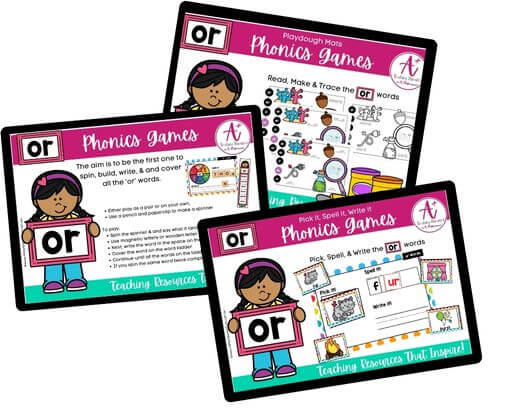
"R" Controlled Phonics - or
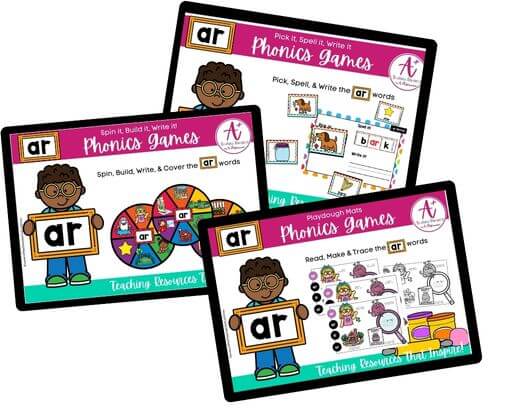
"R" Controlled Phonics - ar
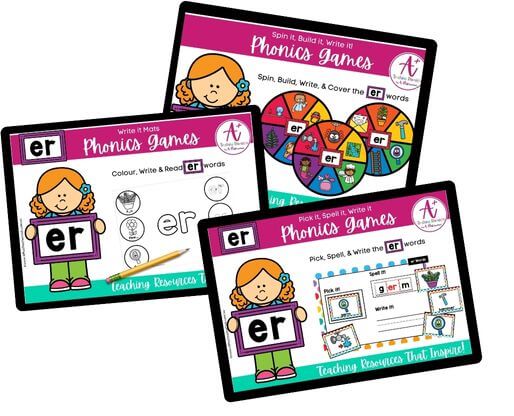
"R" Controlled Phonics - er
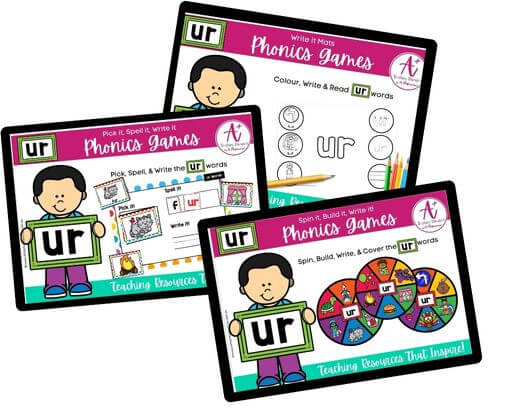
"R" Controlled Phonics - ur
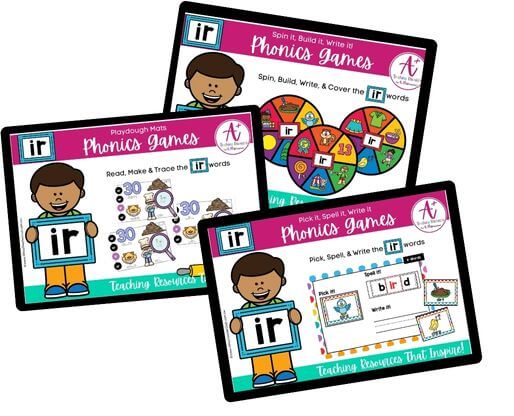
"R" Controlled Phonics - ir
Can't find what you're looking for?
Send us a request! Use this form to request a resource. Please give details of the learning area, topic, year level, curriculum links. We’ll be happy to take a look to see if we can fit it in. Unfortunately a request does not guarantee we will be able to make it!
"*" indicates required fields
